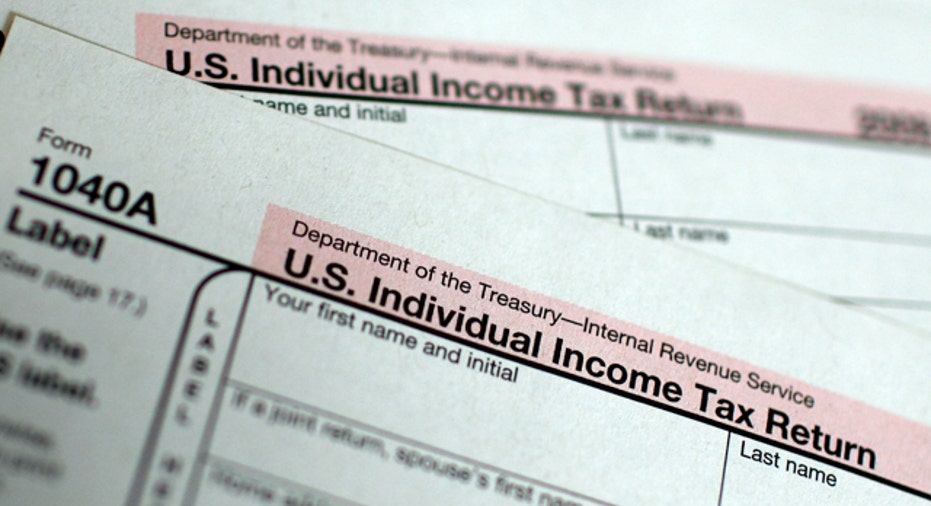The Many Blessings (and Tax Breaks) of Children

Tax joys of parenthood
Is there a new baby in the house? That's good news in many ways, especially at tax time when the chip off the old block will help you chip away at your tax bill.
A growing family makes you eligible for a variety of tax savings. You get an additional tax exemption, may be eligible for several tax credits, and can use tax-favored ways to save and pay for Junior's college. You might even be able to lower your taxes by shifting some of your higher-taxed income to your youngster, either as an asset gift or as salary if you own your own business.
Here are some common tax matters every new -- and experienced -- mom and dad need to consider.
Filing status
The first tax-return item a taxpayer encounters is the choice of how to file. For many couples raising kids together, this is easy. The married-filing-jointly option offers a larger standard deduction and allows some tax breaks that are denied unmarried filers.
If, however, you are raising children alone, don't shortchange yourself by choosing the wrong status. You can file as a head of household if, for more than six months, you provided over half the cost of keeping up a home for yourself and your kids. Tax rates and the standard deduction for head-of-household filers are more favorable than those for the single or married-filing-separately categories.
Parents who have lost spouses also have a choice. You may file as a qualifying widow or widower with a dependent child for two years after the year your husband or wife died. This status gives you the same filing consideration afforded married filers.
Exemptions, aka dependents
More child-related tax savings come from the personal exemptions you claim on your return. Each dependent is an exemption. The Internal Revenue Service sets an annually adjusted amount (it's $3,700 apiece on 2011 returns; $3,800 on 2012 taxes) that you multiply by the number of your exemptions and subtract from your income.
Determining whether your child is a dependent is not a problem when you have young kids at home. But what about when they earn their money from an after-school job or are off at college? While you may have to do a little figuring, especially to see if your young worker needs to file his or her own tax return, this generally won't invalidate your child's status as your dependent. The key considerations are whether you are the child's primary source of support or if he or she is a full-time student at State U.
Single parents have some other issues to consider. Where a formal divorce decree is involved, be sure you follow the custody rules set out there. They determine who gets to claim the children. When custody is shared, parents must decide who claims the kids.
Tax credits
Your growing family could pay off via several tax credits. The great thing about tax credits is that they reduce your tax liability on a dollar-for-dollar basis. A credit of $500 could cut your $1,000 tax bill in half. If you owe no tax, some credits even will get you a refund.
The easiest child-related credit to claim is called simply that, the child tax credit. There are no records to keep or extra forms to file in order to get a $1,000 credit for each child younger than 17 who's claimed as a dependent on your tax return.
If you claim tax relief for more than one kid, you must fill out Form 8812 to compute the additional child tax credit, but the paperwork could well be worth it. This tax break allows filers who owe little or no taxes to get a refund check from the IRS.
Working parents who put the kids in day care can file for the child- and dependent-care credit to recoup some of those costs -- up to $3,000 spent to care for one youngster under age 13, and $6,000 for two or more preteens.
And if your child arrived via adoption, there's a tax credit for that, too.
Education expenses
College costs are skyrocketing, prompting many parents to start saving as soon as the little one arrives. Uncle Sam offers several tax-favored ways to help.
The American opportunity credit, a reformulation of the previous Hope credit, covers costs for the first four years of higher education and is worth up to $2,500. Even better, a portion of the American opportunity credit is refundable, meaning even if you don't owe the IRS anything, you could get some cash back. And the lifetime learning credit, which could cut $2,000 off your tax bill, is still around as well.
Credits usually are more tax beneficial than deductions because credits cut your tax bill dollar-for-dollar. But don't discount the tuition and fees deduction. This tax break lets you subtract up to $4,000 of eligible schooling costs from your income.
And a Coverdell education savings account allows parents (or grandparents or even just friends) to put away up to $2,000 per year (total, not apiece) for a youngster's schooling.
Beware the kiddie tax
One former child-related opportunity to lower your tax bill, however, has been dramatically reduced. Previously, many parents shifted some of their higher-taxed investment income to their young children so that the earnings would be taxed at a lower bracket; for example, falling from a possible 35% rate to the youngsters' usually 10% or 15% bracket.
But the so-called kiddie tax limits this practice. When a young investor's 2011 or 2012 earnings exceed $1,900, the tax rate applied to those excess earnings is the parents' -- not the child's. The higher tax rate remains in place until the child turns 19 or age 24 if the young investor is a full-time student.
So, Mom and Dad, keep an eye on young Jimmy's or Jane's assets because you could be paying the taxes on them.



















